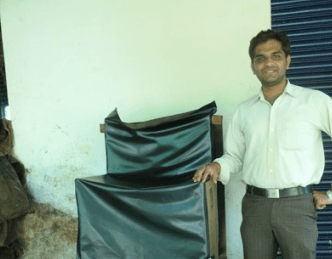Lab in rural India solves community’s unique problems
SELCO employee Sandeep Adhyanthaya shows a fruit dryer built by the lab. Photo by Rhitu Chatterjee.
Story by Rhitu Chatterjee, PRI’s The World. Listen to audio for full report.
A few years back, a local man told Harish Hande about an embarrassing problem. He said during the rainy season women here can’t hang clothes out to dry, so the clothes remain damp.
“Because of which the clothes smell, and because of which there are marital problems,” says Hande. “There’s no physical relationship that happens in a marriage.”
To save Ujire’s marriges, the town needed an inexpensive clothes dryer that worked in the rainy season. Hande says this was not a problem that engineers at big institutes like MIT or Caltech would ever hear about.
“No labs in the world would have got this issue at all.”
Hande heard of the problem because his years of work in the area — selling solar lighting systems — had earned him the community’s respect and trust.
That realization gave Hande an idea: What if he opened a laboratory right here in Ujire? The lab would ask the community about its problems and then would try to solve those problems with new technologies.
The result is SELCO Labs. It is supported by foundations and housed at the local engineering college.
One of the first issues the lab chose to address was an economic problem faced by local banana farmers, says Anand Narayan, the lab’s manager and co-founder.
“The typical story is as a farmer, that I would go to the local retailer and would say, ‘Here is a bunch of bananas,'” explains Narayan. “He will start off with the story that, oh, there is too much bananas in the market, price is very low, I can offer you about five rupees per kilogram, and that really irritates you because that is barely going to recover the cost of your transport.”
So what if there were a way to preserve the bananas and create more demand for farmers’ crops year-round?
The lab devised a solution — an inexpensive fruit dryer. It is currently being tested by one of SELCO’s local partners, a regional non-profit called Sri Kshethra Dharmasthala Rural Development Project that runs a small food packaging unit and employs poor women.
Read the rest of this story and view multimedia on The World website.
———————————————————–
PRI’s “The World” is a one-hour, weekday radio news magazine offering a mix of news, features, interviews, and music from around the globe. “The World” is a co-production of the BBC World Service, PRI and WGBH Boston. More about The World.
